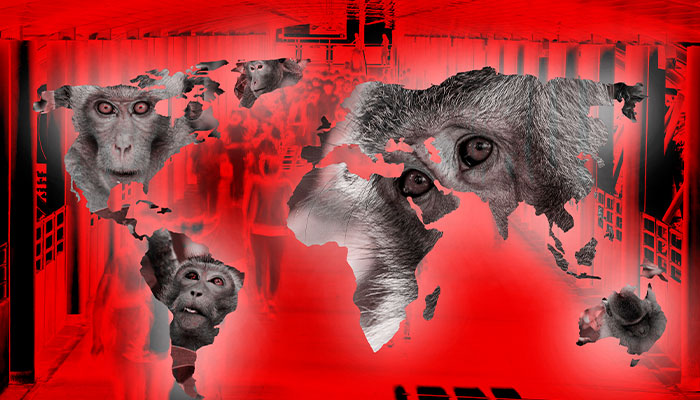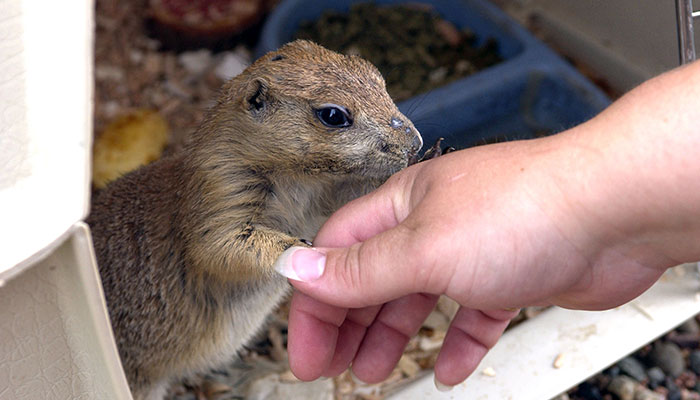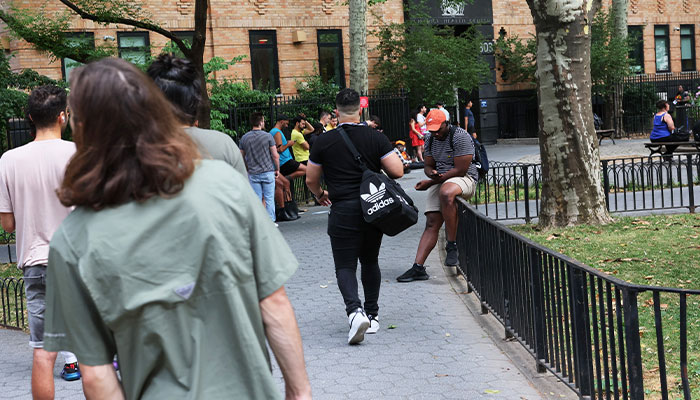As its name suggests, monkeypox is caused by an animal-borne, or zoonotic virus that exists naturally in wild populations of a number of small African mammals including squirrels, pouched rats and dormice.

Super spreader: Since early May, the disease has spread to every region of the globe, with more than 25,000 people infected in 83 countries.
The first human case was identified in 1970, in a remote rainforest region of the Congo, and since then there have been a number of outbreaks in central and west Africa.
Macquarie University Emeritus Professor Peter Curson, an infectious diseases expert, says the first monkeypox outbreak outside Africa occurred in the US in 2003.
“It was linked to contact with infected pet prairie dogs that had been housed close to Gambian giant pouched rats imported from Ghana as pets,” he says.
“Eighty Americans caught monkeypox in that outbreak, and although no one died, it caused considerable fear and panic.”
Usually, it resolves without any treatment, but in those severe cases, antivirals can be of benefit.
The next largest outbreak occurred in Nigeria in 2017, with more than 500 cases, and the disease has since been reported in the UK, Singapore and the US, as well as central and west Africa.
Most of these have had fewer than 500 reported cases, but it’s hard to know the true prevalence of the disease.
Since early May, when the first cases outside Africa were recorded, the disease has spread to every region of the globe, with more than 25,000 people infected in 83 countries – 76 of which have never experienced outbreaks before .
Three people outside Africa have died.
The US is the worst affected country, followed by Spain, Germany and the UK; Australia has recorded 45 cases, most of these in people who have recently returned from overseas.
What are the symptoms?
The symptoms include fever, severe headache, swollen lymph nodes, body aches, and an itchy rash with blisters similar to chicken pox that can spread all over the body.

Pet perils: Infected pet prairie dogs were behind the first outbreak of monkeypox outside Africa, in the US in 2003.
“In most cases, the incubation period is between five and 21 days,” Curson says. “It is usually a self-limiting disease lasting up to four weeks. The effects tend to be relatively mild, although young children may suffer more severely.
“In some rare cases, it can result in serious illness and even death, usually in those who are severely immunocompromised.
“Usually, it resolves without any treatment, but in those severe cases, antivirals can be of benefit.”
The WHO has declared monkeypox to be a global health emergency, and Australia has named it as a “communicable disease incident of national significance”, a step taken to ensure the necessary public health resources are available.
Is there a vaccine?
While monkeypox is relatively new as a human disease, Curson says it had probably been endemic in wild animal populations for centuries before it made the leap to us.
“It used to be kept in check by widespread smallpox vaccination, but when smallpox was declared eradicated in 1980, vaccination was no longer considered necessary,” he says.
“This, and the fact we live in such a mobile world, has provided monkeypox with the opportunity to spread outside its traditional, very limited range.”
The Australian Government still holds a stockpile of smallpox vaccine, but at this stage, vaccination is only recommended for some high-risk people in the community, including close contacts, and healthcare workers caring for monkeypox patients.
How does it spread?
Curson says the disease is not that easy to contract, spreading during extended periods of close contact with an infectious person.

Protection: People wait in line for a monkeypox vaccine outside a health clinic in New York City ... Australia still holds a stockpile of smallpox vaccine.
“It is carried in respiratory droplets and other bodily fluids and blood, and any clothing or linen used by an infected person may also be infectious due to being in contact with the lesions or blood associated with the rash,” he says.
“Many of the people who have contracted monkeypox in the current outbreak are men who have sex with men, but it’s important to remember this is not a disease that is confined to the gay and bisexual community.
The photos we are seeing in the media are quite confronting, and there is always a risk of any virus mutating.
“It can certainly be passed on during sex, because that is when people are in very close contact, but it is not classified as a sexually transmitted disease, and there are other ways for people to be infected.
“For example, the first US case in the current outbreak is believed to have contracted the virus after sitting near an infected person on an international flight.”
How afraid should we be?
With fewer than 50 cases – most of which were acquired overseas – and no deaths to date in Australia, he says we need to put the perceived threat in perspective.
“The photos we are seeing in the media are quite confronting, and there is always a risk of any virus mutating, but if we’re realistic, COVID-19 and even flu present a greater danger than monkeypox as they’re both far more easily transmissible," Curson says.
“There are currently around 45,000 COVID cases and 70 deaths every day in Australia. So far this year, more than 180 Australians have died from influenza.
“Naturally, you should always take sensible precautions if you are at risk of contracting any infectious disease, and monkeypox is no different.
“But the best thing we can do at the moment is to ensure we’re fully vaccinated against COVID-19 and the flu and remain somewhat wary of close contact with people who have been in west or central Africa.”
Peter Curson is an Emeritus Professor in the Department of Health Sciences at Macquarie University



